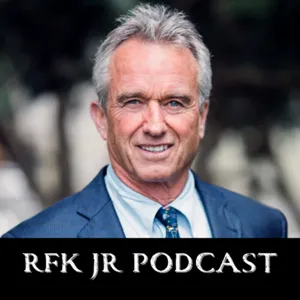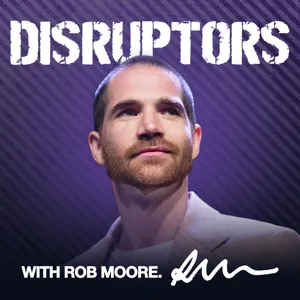Podcast Summary
Small business owners face challenge of lack of professional business front: Dr. Ngozi Okonjo-Iwiyala launched a program to help small businesses overcome the challenge of lacking a professional business front by providing resources and support
For small business owners like Laureate Al-Hassan in Nigeria, lack of a professional business front can hinder growth. In 2011, Al-Hassan ran a small paint business called Larklux Paint, managing production, marketing, and delivery herself. Customers, however, were reluctant to place large orders due to her lack of a formal office. She was trapped in a cycle, needing clients to afford an office but needing an office to keep them. One day, while listening to the radio, she heard an ad for a program aimed at helping small businesses grow. Skeptical, she soon realized it was a scam. This scenario highlights the challenge economists face in helping tiny businesses expand into larger ones. The episode features an interview with Dr. Ngozi Okonjo-Iwiyala, who at the time was working on a solution to this problem. Fast forward to 2023, Okonjo-Iwiyala became the first woman and first African to head the World Trade Organization. The program she launched, though not explicitly mentioned in the episode, aimed to address this issue by providing resources and support to small businesses.
Nigeria's former finance minister proposes cash grants for small businesses to tackle unemployment: Dr. Ngazi's innovative solution of providing cash grants to small businesses through a nationwide contest aims to address unemployment by helping entrepreneurs expand their businesses and create jobs.
Dr. Ngazi, the former finance minister of Nigeria, identified the issue of unemployment among young entrepreneurs and their inability to secure loans from banks to grow their businesses. To address this, she proposed a solution of providing cash grants to small businesses through a nationwide contest. This idea aimed to help these entrepreneurs expand their businesses and create jobs, ultimately addressing the unemployment issue. However, concerns arose regarding the monitoring and selection process. Dr. Ngazi reassured the government by proposing a contest format, which would allow for the evaluation and selection of the most promising business plans. The president of Nigeria, Goodluck Jonathan, endorsed the idea, leading to its implementation. This innovative approach highlights the potential of providing financial support to small businesses to foster growth and job creation.
Randomly selecting business plan winners: When a large number of viable business plans remain after initial filtering, randomly selecting among them can efficiently allocate resources and increase chances of discovering successful ventures.
When faced with the challenge of fairly and effectively selecting winning business plans from a large pool of applicants in a country with significant logistical and corruption concerns, an unconventional solution was proposed: a random selection process. This approach, while seemingly counterintuitive to the traditional contest format, was suggested by David McKenzie, an economist from the World Bank. The rationale behind this method is that after filtering out the clearly unviable business plans, a significant number of applications remain where the potential for success is difficult to distinguish. By randomly selecting among these, resources can be efficiently allocated to a diverse range of businesses, increasing the chances of identifying successful ventures that may have otherwise been overlooked. However, this method raises questions about the very nature of a contest and whether it can truly be called one if winners are chosen at random. Nonetheless, it represents an intriguing approach to addressing the unique challenges presented in this context.
UN competition catalyzes Laureate's business growth: The UN competition's random selection process led to Laureate's business expansion, hiring staff, securing a delivery truck, and renting a proper showroom.
The UN competition, with its random selection of applicants, provided an opportunity for individuals like Laureate Al-Hassan to transform their businesses. Through rigorous training and funding, Laureate was able to expand her paint selling business, hiring staff, securing a delivery truck, and renting a proper showroom. The competition served as a catalyst for growth, demonstrating the potential for random selection in measuring the success of entrepreneurial initiatives. The story highlights the impact of perseverance, as Laureate ignored the ads multiple times before ultimately applying and winning. The UN competition not only changed Laureate's story but also served as a beacon of hope for countless other entrepreneurs in Nigeria.
Uganda Business Competition's Impact: 7,000 Jobs Created: Uganda's U-win business competition created 7,000 jobs at an average cost of $8,500 per job, surprising economists with its effectiveness and potential for replication and expansion.
The U-win business competition in Uganda, which gave out $65,000 to 1,201 winners, resulted in the creation of 7,000 jobs at an average cost of $8,500 per job. Economist Chris Blattman, who studied the program, was surprised by its success, as he expected more failures given the large sums of money given to mostly one-person businesses and the random selection of winners. However, the winners used the money effectively, and the program's results have been hailed as potentially the most effective development program in history. The program's impact is being studied and replicated in other countries, and the ongoing UN competition in Uganda is expanding. Despite creating only a few thousand jobs in a country of 170 million people, the potential for replication and expansion is exciting for economists and development experts.
Exploring Economic Mysteries: Supporting small businesses with loans leads to long-term job creation and economic growth, as shown in Nigeria, Kenya, and Senegal.
Providing financial support to small businesses can lead to long-term job creation and economic growth. This was demonstrated in Nigeria where a UN-backed program, which gave small loans to entrepreneurs, showed positive results five years later. Most of the jobs created were still in existence, and one business owner reported significant growth. The program was also adopted in Kenya and Senegal, and while the UN competition ended in Nigeria, the new president implemented similar initiatives using the lessons learned. For neuroscientist Kimberly Noble, the question is whether increased family income impacts children's cognitive development. These are just a few of the economic mysteries explored on the TED Radio Hour from NPR. If you have a question or topic you'd like us to tackle, email us at planetmoney@npr.org.




![FBA 161: The East Africa & Middle Eastern Fitness Scenes, with Yves Priessler [Part 2 of 2]](https://www.podcastworld.io/podcast-images/fitness-business-asia-podcast-we92abl7.webp)

